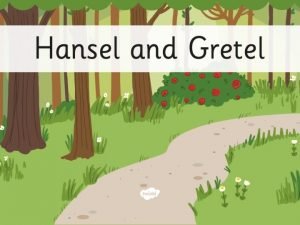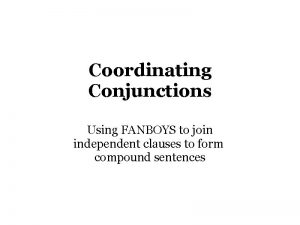INDEPENDENT DIRECTORS WOMAN DIRECTORS AND OPPORTUNITIES FOR A

















- Slides: 17

INDEPENDENT DIRECTORS, WOMAN DIRECTORS AND OPPORTUNITIES FOR A CMA W. R. T. THE COMPANIES ACT, 2013 By: Shyam Sundar Sonthalia M. Com. LLB. PGDCA, ACS, FCMA, Regd. Valuer Practicing Cost Accountant and Insolvency Professional Former Chairman, Bhubaneswar Branch of ICAI and EIRC of ICAI Former Chairman, Bhubaneswar Branch of ICSI and Council member EIRC of ICSI Mobile 09437081528 Email : sonthalia_ss@yahoo. co. in

CONTENTS q q q q q Definitions Why it is necessary to appoint an ID Who can be an ID Strength of ID Procedure for appointment Resignation / Removal Sitting fees or commission Tenure of office Liability Opportunity for a CMA

DEFINITION q Independent Director – ØThe Companies Act, 2013, for the first time, defines an Independent Director in Sec 2(47). This section further refers to sec 149(6) stating who can be referred as an Independent Director. q Woman Director – ØSection 149 of the Companies Act, 2013 read with Rule 3 of the Companies (Appointment and Qualification of Directors) Rules, 2014 prescribes for appointment of an Woman director: • every listed company and • every public company having paid-up share capital of not less than Rupees one hundred crore or turnover of Rupees three hundred crore or more.

Necessity to appoint an Independent Director q Companies Act of 2013 has mandated the appointment of Independent Directors to ensure that the affairs of the company are conducted properly and that Satyam like scams do not take place. q Other statutory compliance - SEBI (Issue of Capital and Disclosure Requirements) Regulations 2009. q Helps the company in improving corporate credibility and governance standards functioning as a watchdog. Independent Directors play an active role in various committees set up by company to ensure good governance.

Who can be an Independent Director A person who : Ø Is not a Managing Director nor whole time director nor a nominee director; in other words, a director who is either nonexecutive or part time professional director. q Ø Is neither was nor is a promoter of a company nor its holding or subsidiary or associate company. Ø Is neither had nor has any pecuniary relationship with the company, its holding, subsidiary or associate company of their promoters or directors during the preceding two financial years or during the current financial year.

Who can be an Independent Director A person who : q Ø A relative who has or had pecuniary relationship with the company or holding , subsidiary or associate company of their promoter director or director and the value of such relationship or transaction does not exceed 2% of its gross turnover or total income of Rs. 55, 000 or such higher amount may be prescribed during the immediately two preceding financial years or during the current financial year. Ø has relevant experience, expertise and integrity in the opinion of Board of Directors.

Who can be an Independent Director q A person who : Ø Is neither himself nor his relative had held or holding the position of KMP or currently is or has been the employee of the company, its holding, its subsidiary or its associate company during any three financial years immediately preceding the financial year in which he is sought to be appointed. Ø is neither Chief Executive nor Director, or by whatever name called, in any Non-Profit Organization that receives twenty five percent or more of its receipts from the company or any of its promoters, directors or its holding, subsidiary or associate company or that holds 2% or more of the total voting of the company.

Who can be an Independent Director Ø is neither himself nor any of his relatives is or has been: (i) an employee or proprietor or a partner, in any of the immediately preceding 3 FY, in the firm of auditors, company secretaries in practice or cost auditors of the company or in its holding company or subsidiary company or associate company; or (ii) in any legal or consulting firm that has or had any transaction with the company, its holding company, subsidiary company or associates company, amounting to 10% or more of the gross turnover of such firm or (iii) a person who either holds together with his relatives 2 per cent or more of the total voting power of the company ; or (iv) a person who is neither Chief Executive nor Director, or by whatever name called, in any Non-Profit Organization that receives 25 percent or more of its receipts from the company or any of its promoters, directors or its holding, subsidiary or associate company or that holds 2% or more of the total voting of the company. Ø who possess such other qualification as may be prescribed.

Who can be an Independent Director Restrictions : 1) The person providing legal consulting services or his legal consulting firm is restricted to be an Independent Director if the firm is raising bills which exceed 10% or more of its (firm’s) gross annual turnover. 2) A person who is an employee, proprietor or partner in any firm of Auditors, Practicing Company Secretary or Cost Accountant, during any preceding three years. Ø

Strength of Independent Director � 1. 2. 3. Section 149(4) requires every listed company to appoint minimum one third of total number of directors as Independent Directors. For companies, other than the listed companies Rule 4 of the Companies 2014 provides that following class of public companies shall have at least two persons as Independent Director: Public company having paid up capital of Rs. 10 crores or more Public company having turn over of Rs. 100 crores or more Public company having outstanding loan, debenture and deposits, in aggregate, in excess of Rs. 50 crores.

Procedure for appointment of Independent Director Section 150(1) says that an Independent Director may be appointed from out of the data bank maintained by any association, body, institute as may be notified by Central Government. As per section 152(2) - Appointment of Independent Director shall first be considered in the meeting of the Board of Directors and later on approved by the company by way of ordinary resolution in General Meeting. The second tenure of five consecutive years shall be by way of special resolution passed in the General Meeting.

Resignation / Removal q q Independent Director may resign by sending a letter of resignation in writing to the company and such letter shall be considered in the meeting of Board and when accepted the prescribed return shall be filed with ROC. The Directors’ Report shall contain a reference of such resignation. It is also incumbent upon such director to send such letter of resignation, containing detailed reasons to the ROC within a period of thirty days. An Independent Director can also be removed by the company by passing an ordinary resolution in General Meeting after giving him a reasonable opportunity of hearing pursuant to a special notice as permissible under section 169 of Companies Act 2013.

Sitting fees and / or Commission q q According to sec 149(9) of the Companies Act 2013, the Independent Director is entitled to receive : a) Sitting fees for Board/Committee meetings as may be prescribed under second proviso under section 197(5) b) Reimbursement of expenses for attending the Board/ Committee meetings c) Commission related to profits of company subject to the provisions of section 197 and 198. (The net profits shall be computed in accordance with section 198). The Independent Director, however, shall not be entitled to receive any Stock Option.

Tenure of office of an Independent Director q The Independent Director is entitled to hold office for a term Ø of 5 consecutive years and Ø shall be entitled to appoint further term of 5 years subject to approval of share holders by way of special resolution in the general meeting and disclosure to this effect in the directors report. q The Independent Director shall not hold office Ø in excess of 2 consecutive terms of 5 years and Ø shall be eligible to be appointed after the expiry of three years of ceasing to become a Independent Director. q Besides the above as per mandate of sec 149 (11), he shall not be entitled to be appointed or associated with the company either directly or indirectly for a period of three years.

Liability of an Independent Director Section 149 (12) of the Companies Act An Independent Director or non executive director shall be liable only for those acts of omission or commission of the company which has occurred with his knowledge, attributable through Board processes and with his consent or connivance in the commission of offence or where he has not acted diligently or prudently.

Opportunity for Cost and Management Accountants for being an Independent Director q q According to Rule 5 of the Companies (Appointment and Qualification of Directors) Rules, 2014, an Independent Director shall possess appropriate skills, experience and knowledge in one or more fields of finance, law, management, sales, marketing, administration, research, corporate governance, technical operation or other disciplines related to the company’s business. Section 2 (38) of the Companies Act 2013 “expert” includes an engineer, a valuer, a chartered accountant, a company secretary, a cost accountant and any other person who has the power or authority to issue a certificate in pursuance of any law for the time being in force

Opportunity for Cost and Management Accountants for being an Independent Director q Sec 177 (2) of the Companies Act 2013 - The Audit Committee shall consist of a minimum of three directors with Independent Directors forming a majority. Provided that majority of members of Audit Committee including its Chairperson shall be persons with ability to read and understand, the financial statement. The committee assists the board of directors fulfil its corporate governance and overseeing responsibilities in relation to an entity's financial reporting, internal control system, risk management system and internal and external audit functions.
 Old woman young woman illusion
Old woman young woman illusion A woman travels in a lift. the mass of the woman is 50 kg
A woman travels in a lift. the mass of the woman is 50 kg The human ability to speedily recognize familiar objects
The human ability to speedily recognize familiar objects Once upon a time there lived a woman who had two daughters
Once upon a time there lived a woman who had two daughters Independent clause fanboys independent clause
Independent clause fanboys independent clause Association of state and territorial dental directors
Association of state and territorial dental directors National association of deans and directors
National association of deans and directors Food and beverage directors expect a pour cost of
Food and beverage directors expect a pour cost of Kontinuitetshantering i praktiken
Kontinuitetshantering i praktiken Typiska drag för en novell
Typiska drag för en novell Nationell inriktning för artificiell intelligens
Nationell inriktning för artificiell intelligens Ekologiskt fotavtryck
Ekologiskt fotavtryck Varför kallas perioden 1918-1939 för mellankrigstiden
Varför kallas perioden 1918-1939 för mellankrigstiden En lathund för arbete med kontinuitetshantering
En lathund för arbete med kontinuitetshantering Personalliggare bygg undantag
Personalliggare bygg undantag Personlig tidbok fylla i
Personlig tidbok fylla i A gastrica
A gastrica Förklara densitet för barn
Förklara densitet för barn

































